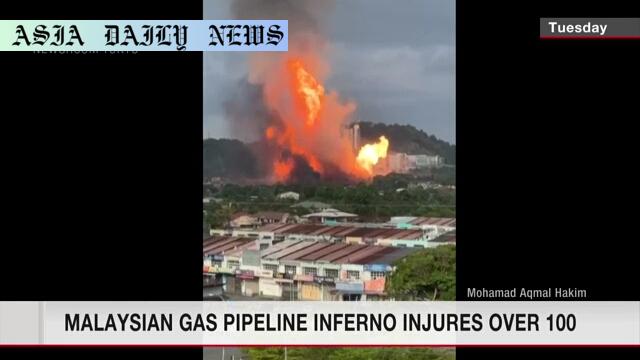Pipeline Fire: A massive blaze near Kuala Lumpur leaves over 100 injured and damages homes, with an investigation now underway.
A catastrophic gas pipeline fire erupted in Kuala Lumpur.
Over 180 individuals treated for burns and respiratory issues.
Hundreds of homes and vehicles were damaged in the fire.
Malaysian Prime Minister promises financial aid for victims.

The Immediate Impact of the Pipeline Fire
The Malaysian city of Kuala Lumpur was shaken by a catastrophic event as a massive fire erupted at a gas pipeline operated by state energy company Petronas. The disaster unfolded near residential areas on the city’s outskirts, catching residents off-guard in an inferno described as ‘unlike anything seen before.’ Flames soared up to 20 stories high, igniting debris that rained down across nearby neighborhoods. The immediate impact of the fire was devastating, sending shockwaves through the local community.
As of now, no fatalities have been reported. However, the toll was still significant, with approximately 180 people hospitalized. Victims are receiving treatment for burns, respiratory complications, and other injuries related to the fire. Alongside these harrowing personal tragedies, physical damage to infrastructure and property was extensive. Hundreds of homes and vehicles were reportedly affected, leaving countless families displaced and in need of assistance. Local authorities and emergency services worked diligently to extinguish the flames and secure the area to prevent further casualties.
Investigation and Response from Authorities
An investigation into the cause of the fire is currently underway. Preliminary reports suggest the potential for significant lapses in safety protocols or equipment failure, though officials have not yet released any confirmed findings. Prime Minister Anwar Ibrahim has spoken out, assuring the impacted communities that financial aid will be provided promptly. The government seems committed to both aiding survivors in their recovery and ensuring similar incidents are mitigated in the future.
Beyond immediate relief, questions arise about the long-term safety and management practices of Petronas, the company operating the pipeline. Residents are demanding accountability, as their lives and property were placed in harm’s way. Critics are calling for a comprehensive review of Malaysia’s energy infrastructure to ensure such disasters do not repeat.
Human Stories Amid Tragedy
Amid the chaos, the stories of courage and survival showcase the resilience of the Malaysian people. A 59-year-old resident who witnessed the fire noted the surreal nature of the event, describing how flaming debris fell from the sky, endangering entire neighborhoods. Volunteers and emergency responders displayed tremendous bravery, risking their safety to assist those trapped or injured.
Community efforts to provide temporary shelter, food, and emotional support to the affected families have further underscored the strength of local solidarity. However, the immense scale of loss cannot be ignored. For many, rebuilding their lives and homes will be a lengthy and arduous process. The government’s promise of financial aid offers a glimmer of hope, but survivors are also looking for systemic changes to prioritize long-term prevention measures over reactive responses.
Lessons Moving Forward
This incident has highlighted the fragility of energy infrastructure and the widespread ramifications of its failures. Future investigations and reforms will need to address both immediate safety concerns and broader systemic issues within Malaysia’s energy sector. Public services such as evacuation drills, awareness campaigns, and emergency response plans can no longer be treated as optional measures but must be embedded as standard practices.
Ultimately, as Kuala Lumpur recovers from this disastrous fire, the need for stringent enforcement of safety and oversight emerges as an undeniable priority. The hope remains that this tragedy will prompt systemic changes that prevent similar episodes in the years ahead.
Commentary
The Unpredictable Toll of Industrial Disasters
The recent pipeline fire in Kuala Lumpur serves as a grim reminder of the unpredictability and often tragic consequences of industrial accidents. Despite rigorous regulations and modern technology, failures in infrastructure or safety protocols can still lead to devastating outcomes. This incident not only caused physical destruction but also deeply affected the lives of hundreds of individuals, leaving lasting emotional and financial scars.
Holding Authorities Accountable
While accidents can happen, they often reveal underlying issues in oversight, maintenance, or both. With Petronas at the center of this disaster, questions inevitably arise regarding the company’s adherence to mandatory safety standards and practices. Was this accident due to negligence or a systemic failure? These questions demand thorough and transparent answers. Authorities have an obligation to ensure that affected individuals receive answers as well as guarantees of improved safety measures moving forward.
The Strength of the Malaysian Community
Despite the chaos, the resilience displayed by the Malaysian community is inspiring. Neighbors helping neighbors, emergency responders risking their lives, and volunteers playing critical roles in the immediate aftermath are all examples of humanity at its best. These collective efforts are a testament to the strength of local unity. However, community goodwill can only go so far. Long-term recovery will require coordinated efforts between the government, energy companies, and international partners to rebuild both physical infrastructure and trust.
The Path Forward
This disaster, while tragic, can also act as a catalyst for positive change. It calls for stricter regulations, increased public awareness of safety protocols, and enhanced preparedness for disasters. Additionally, it’s an opportunity to revisit Malaysia’s energy policies, ensuring that modernization and sustainability are at the forefront without compromising safety. Only through such proactive measures can the nation ensure that the lessons learned from this tragedy create a safer future for all its citizens.


